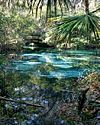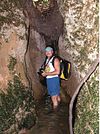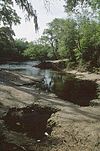List of major springs in Florida
Alexander Spring in Lake County Geologists from the Florida Department of Environmental Protection claim that the U.S. state of Florida may have the largest convergence of freshwater springs on the planet, with over 700.[ 1] springs are naturally occurring places where water flows from the aquifer (underground) to the surface. There are springs located within 21 Florida State Parks .
In the 1800s, the crystal clear water attracted development; 14 Florida cities have "Spring" in their name.[ 2] [ 3] [ 4] [ 5]
The first comprehensive study of Florida's springs was published in 1947. The next update was released 30 years later in the Florida Geological Survey Bulletin No. 31, Revised, "Springs of Florida".[ 6] [ 7] Florida Geological Survey Bulletin 66 , and identified 720 springs, of which 33 were first magnitude , 191 were second magnitude, and 151 were third magnitude.[ 7] river rise (RR) is where a river emerges after flowing underground for a distance; a single spring (SS) has one underground source, but may flow through multiple rock fissures ; a group spring (GS) has multiple underground sources; a sink (SK) is an opening in the Earth's surface that occurs from karst processes [ 8] suffosion .[ 9]
Volume values listed are the most recent found, mostly after 2000, but water outflows have diminished significantly since the 1990s with drought conditions and increased pumping from the Floridan aquifer .[ 10] White Springs and Worthington Springs , where tourists flocked to drink and soak in the mineral water beginning in the late 1800s.[ 1] [ 11] Boulware Springs provided water for the city of Gainesville, Florida and the University of Florida until 1913, when reduced outflow required a new water source.[ 12] [ 13]
Many of the springs listed herein are indicated as privately owned, which is a misnomer. "Private individuals cannot 'own' a spring that is along/accessible from a navigable waterway [ 14] Clean Water Act (CWA) defined the term "navigable waters", the meaning has been litigated. Following U.S. Supreme Court rulings, the Federal Register published EPA's final definition on November 26, 2008. Section (3) states: "intrastate lakes, rivers, and streams which are utilized by interstate travelers for recreational or other purposes (are navigable waters).[ 15] [ 16]
Note: The table of contents only applies when the list is sorted by spring name.
"Mag" refers to the daily magnitude of water flow.
"Type" denotes RR-River Rise; SS-Single Spring; GS-Group Spring; SK-Sink.
"Daily flow in millions" is the volume of daily water outflow in millions of gallons/litres.
"Temp" is water temperature in degrees Fahrenheit/Celsius.
"Own" shows ownership of surrounding property: S/tate; F/ederal; P/rivate; C/ounty
Left mouse click on the up/down arrows to sort the list by that column.
Key
†
Spring is located within a Florida State Park
‡
Spring is located within the Ocala National Forest
#
Limited access: requires permission or access from water
§
Volume is for Group, not individual spring
↑
Scuba diving is permitted
Daily magnitude [ 14]
1st
> 64.6 million gallons (100 ft³/s)
2nd
> 6.46 million gallons (10 ft³/s)
3rd
> 646,000 gallons (1 ft³/s)
4th
> 144,000 gallons (100 gal/min)
Zero
No flow
Mag[ 7]
Spring name
Outflow body[ 7]
Type[ 7]
County[ 7]
Daily flow[ 7]
Temp[ 7]
Own[ 7]
Photo
1st
Alapaha Rise #
Alapaha River
RR
Hamilton
70.3 °F (21.3 °C)
P
1st
Alexander ‡
St. Johns River
SS
Lake
74.5 °F (23.6 °C)
F ↑
2nd
Apopka #
Lake Apopka
SS
Lake
75.5 °F (24.2 °C)
P ↑
2nd
Aucilla (Wacissa)
Wacissa River
GS
Jefferson
68.9 °F (20.5 °C)
P ↑
2nd
Baltzell
Chipola River
GS
Jackson
67.7 °F (19.8 °C)
S/C
2nd
Beecher #
St. Johns River
SS
Putnam
73.1 °F (22.8 °C)
S
1st
Big Blue (Wacissa)
Wacissa River
GS
Jefferson
68.9 °F (20.5 °C)
P ↑
1st
Blue †
St. Johns River
SS
Volusia
73.0 °F (22.8 °C)
S ↑
3rd
Blue (Levy County)
Waccasassa River
SS
Levy
[ 17] 70.9 °F (21.6 °C)
C
1st
Blue Grotto (Silver) †
Silver River
GS
Marion
74.3 °F (23.5 °C)
P
2nd
Blue Hole
Chipola River
SS
Jackson
[ 18] 67.80 °F (19.89 °C)
S
1st
Blue Hole (Ichetucknee) †
Ichetucknee River
GS
Columbia
71.4 °F (21.9 °C)
S ↑
4th
Boulware
Sweetwater Branch Creek
SS
Alachua
[ 12] 72.0 °F (22.2 °C)[ 12]
C
2nd
Branford
Suwannee River
SS
Suwannee
69.5 °F (20.8 °C)
C
2nd
Buckhorn Main #
Alafia River
GS
Hillsborough
76.5 °F (24.7 °C)
P
2nd
Bugg #
Lake Denham
SS
Lake
74.2 °F (23.4 °C)
P
1st
Cedar Head (Ichetucknee) †
Ichetucknee River
GS
Columbia
71.4 °F (21.9 °C)
S
1st
Chassahowitzka
Chassahowitzka River
GS
Citrus
73.4 °F (23.0 °C)
S ↑
2nd
Citrus Blue
Withlacoochee River
SS
Citrus
72.8 °F (22.7 °C)
P ↑
2nd
Columbia #
Santa Fe River
SS
Columbia
72.3 °F (22.4 °C)
P
2nd
Copper
Suwannee River
GS
Dixie
71.1 °F (21.7 °C)
P
NA
Cow #
Suwannee River
SK
Lafayette
NA
71.8 °F (22.1 °C)
P ↑
2nd
Crystal Springs #
Hillsborough River
SS
Pasco
[ 19] 72 °F (22 °C)
P
1st
Cypress #
Holmes CreekChoctawhatchee River
SS
Washington
67.7 °F (19.8 °C)
P
2nd
De Leon †
Spring Garden CreekSt. Johns River
SS
Volusia
73.3 °F (22.9 °C)
S ↑
NA
Devil's Den
None
SK
Levy
NA
72.0 °F (22.2 °C)
P ↑
2nd
Devil's Ear/Eye/Little
Santa Fe River
GS
Gilchrist
72.6 °F (22.6 °C)
P ↑
1st
Emerald (Gainer #2)
Econfina Creek
GS
Bay
70.5 °F (21.4 °C)
P ↑
2nd
Ellaville
Suwannee River
SS
Suwannee
73.2 °F (22.9 °C)
P ↑
1st
Falmouth
Karst fenster
SS
Suwannee
69.3 °F (20.7 °C)
S
1st
Fanning †
Suwannee River
SS
Levy
72.9 °F (22.7 °C)
P
2nd
Fenney #
Shady BrookLake Panasoffkee
SS
Sumter
73.6 °F (23.1 °C)
P
2nd
Fern Hammock ‡
Juniper CreekLake George
GS
Marion
71.7 °F (22.1 °C)
F
1st
Gainer #3
Econfina Creek
GS
Bay
70.9 °F (21.6 °C)
P/S ↑
4th
Gator #
Hammock Creek
SS
Hernando
65.5 °F (18.6 °C)
P ↑
2nd
Gilchrist Blue
Santa Fe River
GS
Gilchrist
72.8 °F (22.7 °C)
P ↑
2nd
Gemini Springs
Lake Monroe
GS
Volusia
72 °F (22 °C)
C
2nd
Ginnie
Santa Fe River
GS
Gilchrist
72.5 °F (22.5 °C)
P ↑
4th
Glen
Hogtown Creek
SS
Alachua
71.8 °F (22.1 °C)
P
3rd
Green Cove
St. Johns River
SS
Clay
75.9 °F (24.4 °C)
C
3rd
Green Springs
Lake Monroe
SS
Volusia
72 °F (22 °C)
C
2nd
Guaranto
Suwannee River
SS
Dixie
73.0 °F (22.8 °C)
C
2nd
Hardee
Withlacoochee River
SS
Hamilton
[ 20] 76.6 °F (24.8 °C)
S
2nd
Hart
Suwannee River
GS
Gilchrist
71.9 °F (22.2 °C)
C ↑
2nd
Hernando Salt #
Mud River
SS
Hernando
74.9 °F (23.8 °C)
P ↑
1st
Holton Creek Rise #
Suwannee River
RR
Hamilton
[ 21] 71.8 °F (22.1 °C)
S
1st
Homosassa †
Homosassa River
GS
Citrus
74.3 °F (23.5 °C)
S
2nd
Hornsby #
Santa Fe River
SS
Alachua
[ 10] 72.5 °F (22.5 °C)[ 10]
P ↑
2nd
Hunter (Kings Bay)
Crystal River
GS
Citrus
73.4 °F (23.0 °C)
C/P
1st
Ichetucknee †
Ichetucknee River
GS
Columbia
71.5 °F (21.9 °C)
S
1st
Jackson Blue
Merritt's MillpondChipola River
GS
Jackson
69.7 °F (20.9 °C)
S/C
2nd
Juniper ‡
Juniper CreekLake George
GS
Marion
71.6 °F (22.0 °C)
F
1st
Kings Bay
Crystal River
GS
Citrus
73.2 °F (22.9 °C)
S/P
1st
Kini/Upper River Sink
Karst fenster
SK
Wakulla
[ 6] 69.8 °F (21.0 °C)[ 6]
P
Zero
Kissingen
Peace River
GS
Polk
[ 6] 72.0 °F (22.2 °C)[ 22]
P
1st
Lafayette Blue †
Suwannee River
SS
Lafayette
71.1 °F (21.7 °C)
S ↑
4th
Levy Blue #
Waccasassa River
SS
Levy
69.8 °F (21.0 °C)
C
1st
Lime Sink Run †
Suwannee River
SS
Suwannee
[ 14] 72.2 °F (22.3 °C)
S
2nd
Lithia Major, Minor
Alafia River
GS
Hillsborough
77.2 °F (25.1 °C)
C
3rd
Little #
Weeki Wachee River
SS
Hernando
74.6 °F (23.7 °C)
P ↑
2nd
Little River
Suwannee River
SS
Suwannee
72.1 °F (22.3 °C)
S ↑
1st
Madison Blue †
Withlacoochee River
SS
Madison
70.3 °F (21.3 °C)
S/C ↑
4th
Magnolia #
Hammock Creek
SS
Hernando
74.3 °F (23.5 °C)
P
2nd
Manatee †
Suwannee River
SS
Levy
72.5 °F (22.5 °C)
S ↑
1st
McCormick (Gainer #1)
Econfina Creek
GS
Bay
70.8 °F (21.6 °C)
P ↑
1st
Morrison
Choctawhatchee River
SS
Walton
67.8 °F (19.9 °C)
S/C ↑
1st
Natural Bridge †
Karst fenster St. Marks River
SS
Leon
68.1 °F (20.1 °C)
P
1st
Nutall Rise
Aucilla River
RR
Jefferson
70.3 °F (21.3 °C)
P
3rd
Orange #
Orange Creek Oklawaha River
GS
Marion
74.0 °F (23.3 °C)
P
2nd
Otter
Suwannee River
SS
Gilchrist
72.7 °F (22.6 °C)
P
NA
Paradise[ 23]
None
SK
Marion
NA
73.0 °F (22.8 °C)
P ↑
3rd
Peacock †
Suwannee River
GS
Suwannee
69.5 °F (20.8 °C)
S ↑
2nd
Pitt
Econfina Creek
GS
Walton
[ 6] 71.6 °F (22.0 °C)[ 6]
C
2nd
Poe
Santa Fe River
SS
Alachua
72.5 °F (22.5 °C)
C
2nd
Ponce de Leon †
Sandy CreekChoctawhatchee River
GS
Holmes
67.8 °F (19.9 °C)
S
1st
Rainbow †
Rainbow River Withlacoochee River
GS
Marion
74.1 °F (23.4 °C)
S/P
1st
Roaring (Ichetucknee) †
Ichetucknee River
GS
Columbia
70.0 °F (21.1 °C)
S
2nd
Rock
Rock Springs Run Wekiva River
SS
Orange
74.9 °F (23.8 °C)
C
2nd
Rock Bluff
Suwannee River
GS
Gilchrist
71.6 °F (22.0 °C)
P ↑
Zero
Rossetter
Withlacoochee River
SS
Hamilton
76.6 °F (24.8 °C)
S
3rd
Royal
Suwannee River
SS
Suwannee
[ 10] 72.7 °F (22.6 °C)[ 10]
C
2nd
Running East, West #
Suwannee River
GS
Lafayette Suwannee
71.8 °F (22.1 °C)
P ↑
2nd
Salt (Marion) ‡
Lake George
SS
Marion
74.5 °F (23.6 °C)
F
2nd
Sanlando #
Wekiva River
SS
Seminole
76.4 °F (24.7 °C)
P
2nd
Santa Fe #
Santa Fe River
SS
Columbia
[ 10] 73.0 °F (22.8 °C)[ 10]
P ↑
2nd
Santa Fe Rise †
Santa Fe River
RR
Alachua
72.5 °F (22.5 °C)
S ↑
2nd
Shangri La #
Merritt's MillpondChipola River
SS
Jackson
[ 3] 69.7 °F (20.9 °C)
P ↑
1st
Silver †
Silver River Oklawaha River
GS
Marion
73.8 °F (23.2 °C)
S
2nd
Silver Glen ‡
St. Johns River
GS
Marion
74.1 °F (23.4 °C)
F
1st
Siphon Creek Rise #
Santa Fe River
RR
Gilchrist
72.4 °F (22.4 °C)
S
1st
Spring Creek
Apalachee Bay
SS
Wakulla
70.9 °F (21.6 °C)
S/P
1st
St. Marks Rise #
St. Marks River
RR
Leon
68.8 °F (20.4 °C)
P
2nd
Starbuck #
Wekiva River
SS
Seminole
76.1 °F (24.5 °C)
P
1st
Steinhatchee Rise
Steinhatchee River
RR
Taylor Dixie
70.0 °F (21.1 °C)
S
2nd
Sun
Suwannee River
SS
Gilchrist
72.7 °F (22.6 °C)
P
2nd
Suwanacoochee
Withlacoochee River
SS
Suwannee
69.9 °F (21.1 °C)
S ↑
2nd
Suwannee
Suwannee River
GS
Suwannee
72.5 °F (22.5 °C)
S
2nd
Suwannee Blue #
Suwannee River
SS
Suwannee
70.9 °F (21.6 °C)
P
1st
Tarpon Hole (Kings Bay)
Crystal River
GS
Citrus
73.2 °F (22.9 °C)
C/P
2nd
Telford
Suwannee River
SS
Suwannee
70.2 °F (21.2 °C)
P
2nd
Three Sisters (Kings Bay)
Crystal River
GS
Citrus
73.3 °F (22.9 °C)
P
1st
Treehouse #
Santa Fe River
SS
Alachua
71.4 °F (21.9 °C)
P
1st
Troy †
Suwannee River
SS
Lafayette
[ 21] 71.0 °F (21.7 °C)
S ↑
2nd
Volusia Blue †
St. Johns River
SS
Volusia
73.6 °F (23.1 °C)
S ↑
2nd
Vortex
Blue/Sandy CreekChoctawhatchee River
SS
Holmes
71.6 °F (22.0 °C)[ 6]
P ↑
2nd
Wacissa Group
Wacissa River
GS
Jefferson
68.90 °F (20.50 °C)
S/P
1st
Wakulla †
Wakulla River
SS
Wakulla
70.2 °F (21.2 °C)
S
3rd
Waldo #
Fenholloway River
SS
Taylor
74.5 °F (23.6 °C)
P
3rd
Wall [ 24] Boggy Bayou
SS
Pinellas
74.0 °F (23.3 °C)
C
3rd
Warm Mineral
Myakka River
GS
Sarasota
86.4 °F (30.2 °C)
P
1st
Weeki Wachee †
Weeki Wachee River
SS
Hernando
74.7 °F (23.7 °C)
S ↑
2nd
Wekiva
Wekiva River
SS
Levy
73.2 °F (22.9 °C)
P
2nd
Wekiwa †
Wekiva River
SS
Orange Seminole
74.1 °F (23.4 °C)
S
3rd[ 25]
Welaka
St. Johns River
SS
Putnam
74.7 °F (23.7 °C)
P
2nd
White
Suwannee River
SS
Hamilton
68.0 °F (20.0 °C)[ 6]
S
2nd
Williford #
Econfina Creek
GS
Washington Bay
70.0 °F (21.1 °C)
S
3rd
Worthington
Santa Fe River
SS
Union
[ 6] 68.0 °F (20.0 °C)[ 6]
C
See also
References
^ a b "Florida Springs" . State of Florida, Department of Environmental Protection. Retrieved 22 January 2013 .^ Marth, Del & Marty (1990). The Rivers of Florida 100–102 . ISBN 0-910923-70-1 ^ a b "Jackson Blue Spring Water Assessment" (PDF) . November 2001 . North West Florida Water Management District. Archived from the original (PDF) on 16 May 2013. Retrieved 29 January 2013 .^ Stamm, Doug; Tim Whitney (1994). The Springs of Florida . Pineapple Press. pp. 112 pages. ISBN 1561640484 ^ Stamm, Doug (2008). The Springs of Florida . Pineapple Press. pp. 114 pages. ISBN 978-1561644186 ^ a b c d e f g h i j Rosenau, Jack C.; Glen L. Faulkner; Charles W. Hendry; Robert W. Hull (1977). "Springs of Florida" . Florida Geological Survey Bulletin . 31 : 464 pages. Retrieved 29 January 2013 . ^ a b c d e f g h i Schmidt, Walter; DEP (October 12, 2004). "Springs of Florida" (PDF) . Florida Geological Survey Bulletin . 66 : 677 pages. Retrieved 22 January 2013 . ^ Lard, L., Paull, C., & Hobson, B. (1995). "Genesis of a submarine sinkhole without subaerial exposure". Geology . 23 (10): 949– 951. Bibcode :1995Geo....23..949L . doi :10.1130/0091-7613(1995)023<0949:GOASSW>2.3.CO;2 . {{cite journal }}: CS1 maint: multiple names: authors list (link )^ "Caves and karst – dolines and sinkholes" . British Geological Survey.^ a b c d e f g "Hydrography-Springs and Seeps" . Suwannee River Water Management District. Retrieved 28 January 2013 .^ Ritchie, Bruce (2012-10-29). "White Springs mayor leads support for water legislation that seeks to protect springs" . Florida Current . Archived from the original on 16 February 2013. Retrieved 21 January 2013 . ^ a b c "Water bodies, watersheds and storm water: Boulware Spring" . St. Johns River Water Management District. Archived from the original on 8 May 2012. Retrieved 31 January 2013 .^ "Boulware Springs" . Alachua County Library District. Retrieved 5 February 2013 .^ a b c "List of First-Magnitude Springs in Florida" . Apalachee Hills Landscape. Archived from the original on 5 September 2013. Retrieved 29 January 2013 .^ "Revisions to the Regulatory Definition of "Navigable Waters" . November 26, 2008 . Environmental Protection Agency. Retrieved 29 January 2013 .^ Lehman, Jeffrey; Phelps, Shirelle (2005). West's Encyclopedia of American Law, Vol. 7 . Detroit: Thomson/Gale. p. 212. ISBN 9780787663742 ^ Hornsby, David; Ceryak, Ron (January 2000). "Springs of the Aucilla, Coastal, and Wacasassa Basins in Florida" . Suwannee River Water Management District . p. 48. Retrieved June 3, 2023 . ^ Barrios, Kristopher; Chelette, Angela (July 2002). Chipola River Spring Inventory Jackson and Calhoun Counties (PDF) (Report). Northwest Florida Water Management District. ^ "Crystal Springs Preserve" . Crystal Springs Preserve. Retrieved 31 January 2013 .^ "Underwater cave and spring on 305 acre plantation" . United Country Real Estate. Archived from the original on April 19, 2017. Retrieved April 19, 2017 .^ a b Hornsby, David; Ceryak, Ron (January 2000). "Springs of the Aucilla, Coastal, and Wacasassa Basins in Florida" . Suwannee River Water Management District . p. 1. Retrieved June 3, 2023 . ^ Cook, Charles. "Remembering Kissengen Spring" (PDF) . University of South Florida. Retrieved 18 March 2013 . ^ Cundiff, Danny. "Paradise Springs Dive Plan" . Dayo Scuba. Retrieved 3 February 2013 . ^ "Pinellas County, Florida, Park and Conservation Resources - Wall Springs Park" . pinellascounty.org. Retrieved March 31, 2017 .^ "Welaka Springs" . St. Johns River Water Management District. Retrieved 3 February 2013 .
External links
Significant waterways of Florida
Larger rivers Lakes Smaller rivers Creeks and Canals See also












































































































